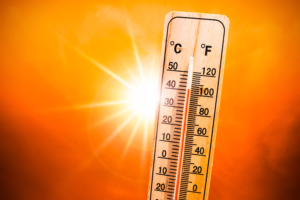
The national forecast for the US predicts this may be one of the hottest summers on record. Across the country heat waves and heat domes are expected
to hit, meaning everyone will be looking for a way to stay cool. For a dialysis patient, this could mean reaching for more fluid than is recommended.
It is well known that being fluid overloaded leads to many complications for people living with end-stage renal disease, and this contributes to poor quality of life, increased hospitalizations, and mortality risk. This is a great time to remind patients there are many ways to stay cool, manage dry mouth,
and still maintain healthy fluid levels for dialysis.
This month, we’re thinking outside the box to help patients stay on track with fluid goals while being able to keep cool.
Beat the heat.
When temperatures rise and AC is limited or hard to come by, these things can help keep people cool:
- Take a cool shower or bath
- Use cold/frozen wash rags or water bottles on wrists, neck, or the crook of the elbow
- Invest in an inexpensive box fan
- Keep curtains and/or blinds closed to keep the inside temperature down
- Enjoy simple recipes that don’t require the stove or oven or can be cooked in a crockpot
Address dry mouth
As things get hot the body is vulnerable to dryness. This includes dry mouth which is a major cause of thirst distress in the dialysis population.
This is a good time to double down on strategies to manage dry mouth including:
- Enjoy ice chips, sugar-free hard candies, or frozen fruit to keep your mouth moist
- Avoid foods with a lot of salt including ultra-processed foods, fast foods, regular sodium canned products, etc.
- Instead, focus on low-sodium or no salt added options provided they do not use potassium additives as a sodium replacement
- Instead of adding salt at the table, try preparing foods with aromatic herbs and spices. They can be dried, or fresh, or both!
- Keep track of fluid intake by logging fluids or use a water bottle that’s marked or pre-measured with the total daily fluid allotment
Try as you might, patients may still end up fluid overloaded. Remember, the best way to improve fluid balance when a person is fluid overloaded on dialysis, is to increase the duration and/or frequency of dialysis. It might also help to check their albumin and nutrition status.
Albumin is the key molecule for drawing fluid out of the interstitial space and into the plasma where it can be removed by dialysis. If your patient has low albumin and inadequate protein and calories are suspected to be a contributing factor, improving nutrition intake can help. If your patient struggles with oral intake, they may be a candidate for IDPN for HD or IPN for PD. To learn more about these therapies, visit pcacorp.com.
We thank our guest blogger Maiya Slusser, MS, RDN, CD, CNSC, for sharing her knowledge and writing this blog post!

